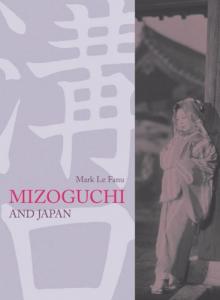Mizoguchi and Japan
(livre en anglais)
de Mark Le Fanu


Moyenne des votes : ![]()
| 0 | vote | |
| 0 | vote | |
| 0 | vote | |
| 0 | vote |
Votre vote : -
Description de l'ouvrage :
For a majority of film-goers, the names most usually associated with classic Japanese cinema are those of Kurosawa and Ozu. Yet during the early 1950s, at the same time that Kurosawa was becoming known to the public through the release of classics like Rashomon and The Seven Samurai, another Japanese director, Kenji Mizoguchi, quietly came out with a trilogy of films-The Life of Oharu, Ugetsu Monogatari and Sansho the Bailiff-that are the equal of Kurosawa's in mastery, and which by any account rank among the greatest and most enduring masterpieces of world cinema. As a storyteller, Mizoguchi was drawn to the plight and oppression of women throughout the ages- it was, for him, the 'subject of subjects'. So in addition to the movies just mentioned, he is remembered for a string of masterly contemporary films that examined, with unprecedented candour and ferocity, the conditions of life in Japanese brothels and geisha houses. Yet, as well as being a moralist. Mizoguchi was a stylist. His films are considered by critics to be among the most beautiful ever made, from a purely pictorial point of view.Filmgoers who have responded enthuslastically in recent years to Chinese classics like Farewell My Concubine or to the colourful works of Zhang Yimou will be delighted to discover 'pre-echoes' of this cinema in such late films by this Japanese master as The Empress Yang Kwei Fei and Tales of the Taira Clan (both released in 1955) works in which colour, costume and decor are utilised with a rare and compelling relinement. Despite his extraordinary qualities as a film-maker, Mizoguchi and Japan is the first full -length study in English for over 20 years of a director whose work is as vibrant now as it ever was in its heyday, and whom the French film review Cahiers du Cinema recently hailed 'the greatest of all cineastes.'
Voir le site internet de l'éditeur BFI Publishing
Voir la filmographie complète de Kenji Mizoguchi sur le site IMDB ...
> Sur un thème proche :
Le Bonsaï qui cache la forêt (2023)
Ozu, Mizoguchi, Naruse, Kurosawa
Kenji Mizoguchi en 8 Films (2019)
de Gabriela Trujillo et Ariane Mnouchkine
Sujet : Réalisateur > Kenji Mizoguchi
Nota : Un livre sur fond de couleur beige est un livre édité dans une autre langue que le français.
(*) Les boutons « Acheter chez Amazon.fr », « Commander sur Fnac.com » & « Rakuten » sont des liens affiliés. Le gestionnaire de ce site reçoit une petite commission lorsque vous achetez un livre après avoir cliqué sur le bouton. Ces (petites) commissions sont les seuls revenus de ce site qui ne contient aucune publicité, aucune insertion (ou mise en avant) payante.